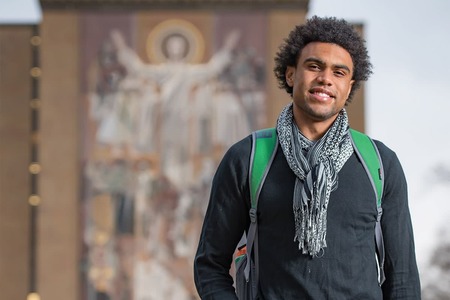The Major
Why Choose PLS?
Are you interested in everything? Do you always have a book in your bag (or two, or three)? Do you love having wide-ranging discussions with your friends that jump from deep questions of human meaning to the mysteries of the natural world to the urgent issues facing contemporary society?
Do you hate it when people tell you that you have to choose just one major (or just two; ok, and maybe a minor)? Do you want your education to be personally transformative, while also preparing you for whatever profession you happen to be passionate about upon graduation? Look no further.
The Program of Liberal Studies is one of the most distinctive, challenging, and rewarding courses of study that you can pursue at the University of Notre Dame. In an integrated curriculum composed of small discussion-based Seminars and Tutorials spanning the arts, history, literature, natural science, philosophy, politics, and theology, students and professors join a vital conversation about what it means to be human.
While some students complement their PLS coursework with a variety of electives, others delve more deeply into specific areas through a second major or minor. Many of our students study abroad, and all take advantage of the range of extracurricular opportunities available to students at Notre Dame. Although all of the courses in the Program are required, our Director of Undergraduate Studies, Dr. Eric Bugyis, will work with you to create a personalized course plan that can accommodate your interests beyond PLS. Contact him at ebugyis@nd.edu to schedule an advising appointment.
The Seminars

The backbone of our curriculum are the six “Great Books'' Seminars, typically taken in successive semesters, that begin in ancient Greece and end in mid-twentieth-century America. In these small, discussion-based classes, we are guided by classic texts from nearly every field of study in a consideration of the most enduring questions of human life. Faculty in these seminars act simply as more experienced readers; it is the texts themselves that are the teachers, and students are expected to set the agenda for the conversation. The seminars will teach you how to read closely and to struggle with often complex and sometimes troubling ideas. You will also learn how to argue passionately, yet civilly, about the most consequential matters in the history of human thought -- love, death, war, justice, identity, society, nature, truth, goodness, and beauty. The word “seminar” means seedbed; in the seminar the seeds of future reading and reflection are sown.
The Tutorials
The Seminars are complemented by thirteen required disciplinary Tutorials led by distinguished research faculty who take students deeper into the primary subjects of the liberal arts. These include: a three-course sequence in philosophy, a three-course sequence in the natural and social sciences, a two-course sequence in theology, a two-course sequence in literature, a course in political theory, a course in intellectual and cultural history, and a course in music and aesthetics. Like the Seminars, these classes are primarily discussion-driven, but with more expert guidance from the professor. In these courses you will gain competence in the core disciplines of the liberal arts. You will learn to write clearly, cogently, and compellingly, following the methods proper to these disciplines, and you will continue to pursue the enduring questions raised in the Seminars with increased depth and sophistication. In the Tutorials, the seeds sown in Seminar may begin to sprout, if only to bear fruit much later in the Program and beyond.
The Senior Thesis

PLS is the only major in the College of Arts and Letters that requires a senior thesis project for graduation. This 35-60 page thesis (~9,000-15,000 words) is your chance to explore a topic or a text of your choosing in greater detail from across the disciplines, and to work one-on-one with an advisor who will support you in bringing this capstone project to completion.
Many PLS students produce extraordinarily creative and intellectually rigorous pieces of scholarship that allow them to integrate their wide-ranging interests. This is the time when the seeds planted in the seminars and nurtured in the tutorials come into their fullest flowering yet. It is your opportunity to take ownership of your education as something that you will carry with you for the rest of your life.